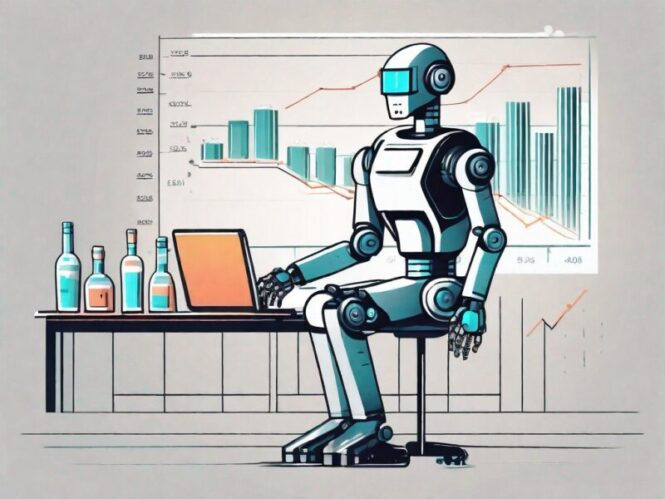One of the most debated topics today is the potential of artificial intelligence in replacing Sales Development Representatives. As AI continues to advance, its role in transforming various business processes is undeniable. Today, we want to talk about this subject in greater detail.
The Capabilities of AI in Sales

The integration of AI in sales has transformed the field, offering an array of tools that excel in data analysis, customer behavior prediction, and automation of routine tasks. This transition has been swift and significant, leading to substantial gains in efficiency. AI systems are adept at handling tasks like lead qualification and initial customer contact, which are traditionally time-consuming. These advancements raise a critical question: Can AI fully replace the human touch inherent in Sales Development Representatives (SDRs)?
Data Analysis and Pattern Recognition
AI’s foremost strength lies in its ability to process and analyze vast amounts of data, a feat unattainable by humans. This capacity not only enhances decision-making but also elevates strategy formulation. AI’s prowess in identifying customer behavior patterns and market trends equips sales teams with insights to craft more targeted and effective sales strategies.
Limitations in Emotional Intelligence
The limitations of AI in emotional intelligence are particularly evident in the realm of sales, which is inherently reliant on understanding and responding to human emotions. Sales is not just a transactional process based on data and analytics; it’s fundamentally about building relationships, understanding client needs, and responding to subtle emotional cues.
AI, while proficient in handling and interpreting vast quantities of data, lacks the ability to fully grasp and respond to the nuances of human emotions and the complexities of interpersonal relationships.
For example, in a sales scenario, an experienced human salesperson can detect subtle shifts in a client’s tone, body language, or expressions, and adjust their approach accordingly. This sensitivity to emotional cues can be crucial in building trust, understanding client hesitations, and effectively addressing concerns.
Their Role in Modern Sales Strategies

While AI boosts efficiency and offers data-driven insights, the role of SDRs transcends these technological capabilities. SDRs are instrumental in establishing and nurturing client relationships, a critical aspect of sales that AI currently cannot replicate.
Human-Centric Skills
SDRs excel in understanding the intricate needs of customers, empathizing with them, and utilizing persuasive skills to influence decisions. These human-centric abilities, encompassing empathy, intuition, and adaptability, remain beyond the scope of current AI technologies.
Flexibility and Creativity
SDRs are pivotal in adapting sales strategies to ever-evolving market conditions. They bring a unique blend of flexibility and creativity, qualities that AI, with its reliance on historical data and predetermined algorithms, cannot yet mimic. In dynamic market scenarios, the human ability to quickly adapt and innovate is invaluable.
Complex Interactions and Personalization
Moreover, SDRs are adept at managing complex customer interactions, offering a level of personalization and customer service that AI, at its current stage, cannot provide. They can tailor conversations, address specific concerns, and build rapport in ways that AI systems are not yet equipped to do.
How Does the Synergy Look Like

The synergy between AI and human Sales Development Representatives (SDRs) in the sales domain is a critical aspect of modern sales strategies, representing a blend of technological efficiency and human insight.
This collaboration can lead to a more efficient and effective sales process, leveraging the strengths of both AI and human intelligence. Sales AI, a blend of AI’s analytical prowess and SDRs’ relational skills, emerges as a formidable force in modern sales strategies.
Here’s a view of this synergy:
Enhanced Data Utilization and Insight Generation
AI’s capacity to analyze large datasets and extract meaningful insights is unparalleled. By integrating AI into sales strategies, SDRs can access deeper insights into customer preferences and market trends. This information allows SDRs to tailor their approaches to each client, enhancing the chances of successful conversions.
Streamlining Sales Processes
AI tools streamline the sales process by automating routine tasks such as lead scoring, data entry, and initial customer interactions. This automation frees up SDRs to focus on more complex and high-value activities, such as negotiating deals and developing long-term client relationships.
Personalized Customer Experiences
The collaboration between AI and human SDRs culminates in offering highly personalized customer experiences. AI, with its data-driven capabilities, serves as the backbone of this process, providing deep insights into customer behavior and preferences.
These insights, derived from AI’s analysis of vast datasets, are crucial in understanding the unique needs and expectations of each customer. SDRs utilize these AI-generated insights to craft customer experiences that are not only tailored to individual preferences but also resonate on a more personal level.
This personalization is achieved through customized communication, tailored product recommendations, and understanding the specific circumstances and challenges faced by each customer. By aligning the sales approach with the customer’s unique context, SDRs can create a more engaging and relevant experience.
This personalized approach is a significant differentiator in competitive markets. In an era where customers are bombarded with generic marketing messages, personalized experiences stand out, fostering stronger customer relationships and loyalty. It demonstrates to customers that their needs and preferences are understood and valued, which is crucial in building trust and long-term engagement.
Real-time Adaptation and Responsiveness

AI tools can monitor market dynamics and customer interactions in real-time, providing SDRs with up-to-date information. This responsiveness allows SDRs to adapt their strategies quickly, respond to customer inquiries more effectively, and seize emerging opportunities.
Continuous Learning and Improvement
The synergy also fosters an environment of continuous learning. AI systems can learn from each sales interaction and adapt their algorithms accordingly. SDRs can use these insights to refine their approaches, ensuring that both the AI systems and the SDRs evolve and improve over time.
Bridging the Emotional Intelligence Gap
While AI excels in data processing and pattern recognition, it lacks emotional intelligence, which is crucial in sales. SDRs bridge this gap by interpreting emotional cues and building genuine relationships with clients, ensuring a human touch in the sales process.
The Bottom Line
AI offers incredible tools for efficiency and data analysis, but the human element that SDRs bring is irreplaceable. The future of sales will likely see AI and SDRs working in tandem, each complementing the other’s strengths. This synergy promises to elevate sales strategies, making them more efficient, effective, and human-centric than ever before.
 Imagup General Magazine 2024
Imagup General Magazine 2024



